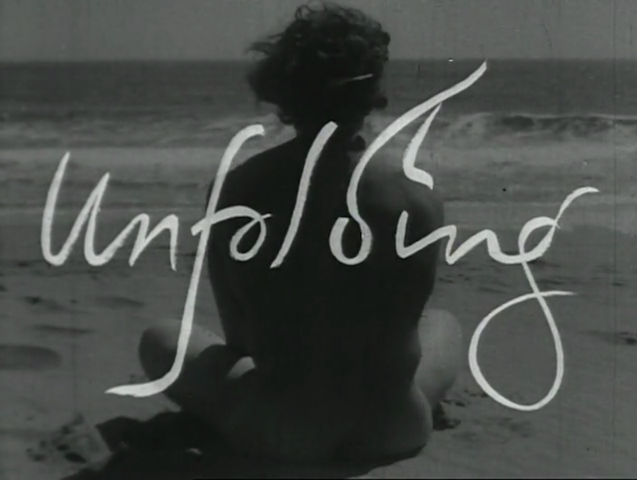Quote:
Set in the bleak aftermath and devastation of the World War I, a recently demobbed soldier, Timosh, returns to his hometown Kiev, after having survived a train wreck. His arrival coincides with a national celebration of Ukrainian freedom, but the festivities are not to last as a disenchanted.Read More »
Amos Vogel: Film as a Subversive Art
-
Aleksandr Dovzhenko – Arsenal [1972 Edit] (1929)
1921-1930Aleksandr DovzhenkoAmos Vogel: Film as a Subversive ArtDramaUSSRWar -
Coni Beeson – Unfolding (1970)
Coni Beeson1961-1970Amos Vogel: Film as a Subversive ArtEroticaExperimentalUSAQuote:
Through a series of dream-like episodes, UNFOLDING suggests universal awareness—aloneness, fantasies, searching, touching, loving. In the vague suggestion of a story, nature and sea mix with hints of legend, ritual, and poetry. UNFOLDING becomes one’s own folklore of imaginings. Double and triple exposure blend ocean, hills, sun, woman, and man, to portray subterranean feelings, ethereal feelings, the freeing of self, in loving and lovemaking, culminating in orgasm.Read More » -
Fumio Kamei – Ikiteite yokatta AKA It Is Good to Live (1956)
Amos Vogel: Film as a Subversive ArtDocumentaryFumio KameiJapanShort FilmFrom Amos Vogel’s Film as a Subversive Art:
This is one of the first documentary films about the survivors of Hiroshima and Nagasaki. It coldly records the lingering effects of the bomb on the victims decades later. In a succession of realistic, shocking sequences, their lives, difficulties, and camaraderie are examined. The very objectivity of incidents, scenes, and faces makes the film the more terrifying.Read More » -
Gunvor Nelson – Kirsa Nicholina (1969)
Gunvor Nelson1961-1970Amos Vogel: Film as a Subversive ArtShort FilmUSAKirsa Nicholina records the birth of a child at home by the Lamaze method. The father assists in the birth, while a physician guides him. At the moment of birth, the mother reaches down and grasps the hand of the emerging child and guides it out of her body and into her arms.Read More »
-
Fred Baker – Events (1970)
1961-1970Amos Vogel: Film as a Subversive ArtCultDramaFred BakerUSAEvents is about a young filmmaker, Ryan, who wants to complete a documentary on Lenny Bruce, decides to raise the needed money by shooting a weekend of porno films enlisting the help of his friends.Read More »
-
Jerzy Skolimowski – Rysopis AKA Identification Marks: None (1965)
Jerzy Skolimowski1961-1970Amos Vogel: Film as a Subversive ArtArthouseDramaPolandQuote:
Jerzy Skolimowski’s debut is a combination of short student films made over the 4 years he spent at the Film School in Łódź. Identification Marks: None is the first instalment in the story about Andrzej Leszczyc, played by the director himself.Read More » -
Peter Emmanuel Goldman – Echoes of Silence (1964)
1961-1970Amos Vogel: Film as a Subversive ArtArthouseExperimentalPeter Emmanuel GoldmanUSA
Desperate sexuality, desperate emotions;
every gesture and inflection an act of grave
import; a film of young adults, infused with
a new existentialist humanism, devoid of
certainty or illusion. The sharp contrast
and graniness of the still indicate the film’s
distance from slick commercial cinema.
A major new talent.
– Amos VogelRead More » -
Alexandre Volkoff – Casanova [English intertitles] (1927)
Alexandre Volkoff1921-1930Amos Vogel: Film as a Subversive ArtDramaFranceSilentRussian stage star Ivan Mosjoukine plays the title role in this far-from-accurate biopic of legendary Italian lover Casanova. The main plot concerns itself with political intrigue, as Casanova travels from Venice to Russia and back again on a variety of “secret missions.” This doesn’t prevent the amorous hero from enjoying the favors of several delectable females. Even Russia’s Catherine the Great (Suzanne Bianchetti) briefly falls under Casanova’s spell. But when all is said and done, it is the lovely Therese (Jenny Jugo) who captures the protagonist’s heart. Highlights include the spectacular Carnival of Venice sequence and the splendiferous scenes within the palace walls of Czarina Catherine. Casanova was truly an international production: It was filmed in France but financed and written by Germans, while its star and director were Russians. The film ran into some curious censorship troubles in the U.S., and as result it was retitled Prince of Adventurers, with the main character rechristened as “Roberto Ferrara”! ~ Hal Erickson, All Movie GuideRead More »
-
John Cassavetes – Faces (1968)
John Cassavetes1961-1970Amos Vogel: Film as a Subversive ArtArthouseDramaUSAA middle-aged man leaves his wife for another woman. Shortly after, his ex-wife also begins a relationship with a younger partner. The film follows their struggles to find love amongst each other.Read More »








